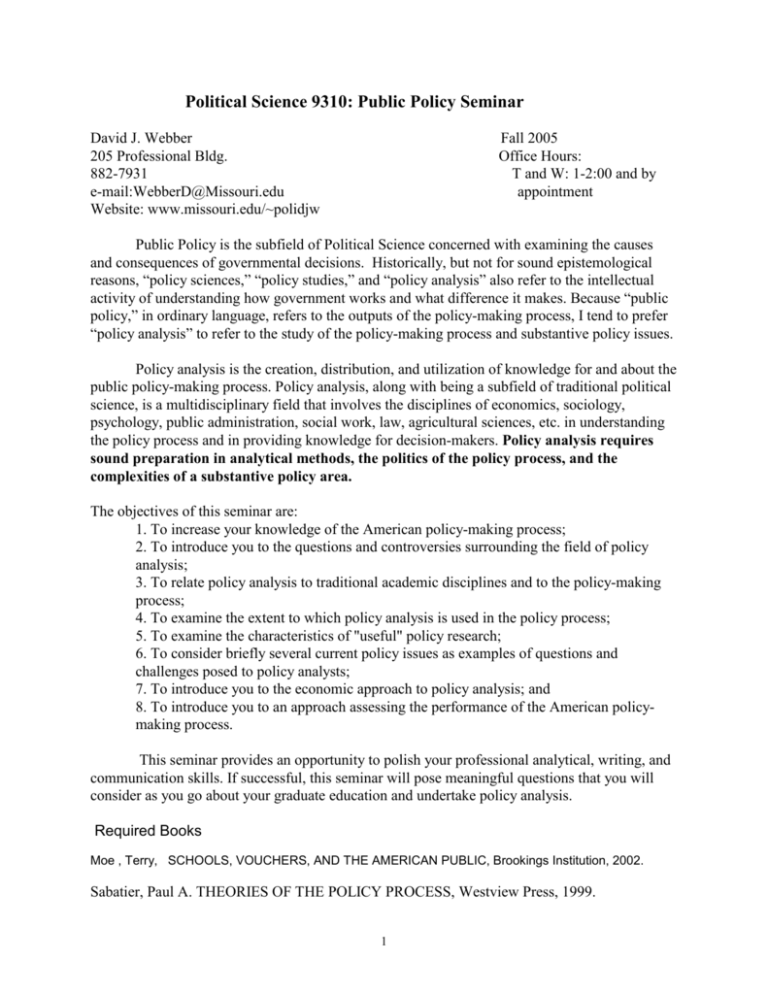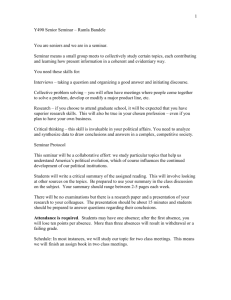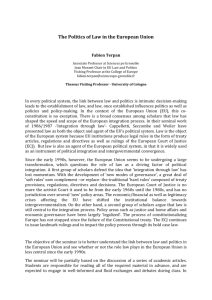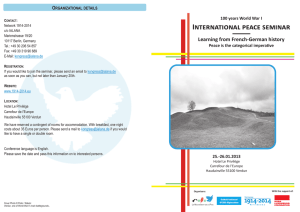
Political Science 9310: Public Policy Seminar
David J. Webber
205 Professional Bldg.
882-7931
e-mail:WebberD@Missouri.edu
Website: www.missouri.edu/~polidjw
Fall 2005
Office Hours:
T and W: 1-2:00 and by
appointment
Public Policy is the subfield of Political Science concerned with examining the causes
and consequences of governmental decisions. Historically, but not for sound epistemological
reasons, “policy sciences,” “policy studies,” and “policy analysis” also refer to the intellectual
activity of understanding how government works and what difference it makes. Because “public
policy,” in ordinary language, refers to the outputs of the policy-making process, I tend to prefer
“policy analysis” to refer to the study of the policy-making process and substantive policy issues.
Policy analysis is the creation, distribution, and utilization of knowledge for and about the
public policy-making process. Policy analysis, along with being a subfield of traditional political
science, is a multidisciplinary field that involves the disciplines of economics, sociology,
psychology, public administration, social work, law, agricultural sciences, etc. in understanding
the policy process and in providing knowledge for decision-makers. Policy analysis requires
sound preparation in analytical methods, the politics of the policy process, and the
complexities of a substantive policy area.
The objectives of this seminar are:
1. To increase your knowledge of the American policy-making process;
2. To introduce you to the questions and controversies surrounding the field of policy
analysis;
3. To relate policy analysis to traditional academic disciplines and to the policy-making
process;
4. To examine the extent to which policy analysis is used in the policy process;
5. To examine the characteristics of "useful" policy research;
6. To consider briefly several current policy issues as examples of questions and
challenges posed to policy analysts;
7. To introduce you to the economic approach to policy analysis; and
8. To introduce you to an approach assessing the performance of the American policymaking process.
This seminar provides an opportunity to polish your professional analytical, writing, and
communication skills. If successful, this seminar will pose meaningful questions that you will
consider as you go about your graduate education and undertake policy analysis.
Required Books
Moe , Terry, SCHOOLS, VOUCHERS, AND THE AMERICAN PUBLIC, Brookings Institution, 2002.
Sabatier, Paul A. THEORIES OF THE POLICY PROCESS, Westview Press, 1999.
1
Scheberle, Denise, FEDERALISM AND ENVIRONMENTAL POLICY, second ed, Georgetown
University Press 2004,
Theodoulou. Stella Z. and Chris Kofinis, THE ART OF THE GAME: UNDERSTANDING
AMERCIAN PUBLIC POLICY MAKING. Thomson, 2004.
Weimer, David L. and Aidan R. Vining, POLICY ANALYSIS: CONCEPTS AND PRACTICE,
4th edition, Pearson Prentice Hall, 2005.
Course Procedure
Reading and discussion are the principal activities of this seminar. The required papers
are intended to further class discussion. Each participant is expected to do all of the assigned
readings before the seminar sessions. While an effort will be made to discuss the highlights of
each reading, you are "responsible" for all readings including ones we do not explicitly discuss in
class.
One emphases of this seminar is the “economic approach to policy analysis.” Since this can be
rather technical reading, rather than spend four weeks on one book (i.e. Weimer and Vining), I
have broken it up into two parts. I suspect comprehension will increase but there may be a loss of
continuity and closure.
I encourage you to use e-mail and the Internet for obtaining policy information and
communicating with members of this class. I have established a website
(www.missouri.edu/~polidjw) which can serve as a starting point for your journey into public
policy resources on the Internet. You should skim the APSA’s Public Policy Section’s website.
Course Requirements
1. Discussion -- Seminar members are expected to participate actively in each week's
discussion. All members of the seminar are expected to complete assigned readings before each
seminar meeting. Up to 100 points may be earned for seminar participation.
2. Papers --A short paper (up to 100 points each) on each of the following three topics is
required:
1. After describing a current American policy issue, speculate about the “real cause” of
the policy problem. Give specific attention to (1) the extent that governmental
ineffectiveness is the cause of the problem and (2) the contribution you would want
political science to play in addressing those causes. Your essay is due Monday,
September 12 at noon.
2. Apply the advocacy coalition framework to a policy issue of your choice. What
problems and difficulties will you face in such an endeavor? How will you deal with
these difficulties? This paper is due Monday, October 24 at noon.
2
3. After reading the assigned reading on education write a review of several of the
articles examining the contribution political science can make to improving education
policy. This paper is due Monday, November 14 at noon.
The three short papers are to be your articulate thoughts on some of the specific topics
we will discuss during the seminar. A short-paper is about 5-7 typewritten pages
3. Research Design (worth up to 200 points).
Prepare a full “research design” examining an American policy problem, its causes, and
several alternative solutions. Your research designs needs to be specific enough that another
person could carry it out. Describe the variables you would use, your data sources, and the
method of analysis. This is due Monday, December 5 and is the basis for a brief class
presentation.
4.. Final exam -- There will be a comprehensive final exam (worth up to 100 points)
given at a mutually agreeable time during finals week.
The final course grade will be determined by the three short papers (total of 300),
research design (200), seminar participation (100 points), and the final exam (100 points). Final
grades will be calculated on the traditional scale of 90% or higher earns an A, 80-90 earns a B,
etc. Since the papers are intended to motivate seminar discussion, late papers are frowned upon
and will be penalized.
COURSE OUTLINE
Week 2. DEMOCRACY, POLITICAL SCIENCE, PUBLIC POLICY, AND POLICY
ANALYSIS
Read:
Peter DeLeon (1995) “Democratic Values and the Policy Sciences,” AMERICAN
JOURNAL OF POLITICAL SCIENCE 39: 886-905. (available electronically, as are
many academic articles).
Robert Dahl, “What Political Institutions Does Large-Scale Democracy Require?”
POLITICAL SCIENCE QUARTERLY 120 (2005): 187-197
Weimer and Vining, Chapter 2, “What is Policy Analysis?” and Chapter 3, “ Toward
Professional Ethics,”
Kevin Smith, “Data Don’t Matter” PERSPECTIVES ON POLITICS, June 2005
3
Paul Sabatier, “The Need for Better Theories,” chapter 1 in Sabatier, THEORIES OF
THE POLICY PROCESS.
Future reading:
Dahl, Robert A.. (1998) ON DEMOCRACY, Yale University Press.
March, James G. and Johan P. Olsen (1995) DEMOCRATIC GOVERNANCE. New
York: The Free Press.
Held, David, ed. (1993) PROSPECTS FOR DEMOCRACY. Stanford University Press.
Pateman, Carol (1970) PARTICIPATION AND DEMOCRATIC THEORY. London:
Cambridge University Press.
Barber, Benjamin (1984) STRONG DEMOCRACY. Berkeley: University of California
Press.
Week 3: OVERVIEW OF AMERICAN POLICY MAKING
Read: Theodoulou and Kofinis, THE ART OF THE GAME: UNDERSTANDING
AMERCIAN PUBLIC POLICY MAKING (the entire volume).
Week 4: APPROACHES TO AND METHODOLOGICAL FOUNDATIONS OF POLICY
ANALYSIS
Read:
M.E. Hawkesworth, "Epistemology and Policy Analysis," Chapter 9 in Dunn and Kelly
Frank Fischer (1998) “Beyond Empiricism: Policy Inquiry in Postpositivist Perspective,”
POLICY STUDIES JOURNAL 26: 129-146.
Peter deLeon (1998) “Models of Policy Discourse: Insights versus Prediction,” POLICY
STUDIES JOURNAL. 26: 147-161.
Ann Chih Linn (1998) “Bridging Positivist and Interpretivist Approaches to Qualitative
Methods,” POLICY STUDIES JOURNAL 26: 162-180.
Susan B. Hansen (1983) "Public Policy Analysis: Some Recent Developments and
Current Problems," pp. 217 - 246 in Ada W. Finifter (ed), POLITICAL SCIENCE: THE STATE
OF THE DISCIPLINE. Washington, D.C.: American Political Science Association.
Lawrence M. Mead (1983) "A Dialogue on Economics, Political Science, and Public
Policy: A Meaning for Public Policy," POLICY STUDIES JOURNAL, 12: 247-250.
4
Lawrence M. Mead (1985) "Policy Studies and Political Science," POLICY STUDIES
REVIEW 5: 319-336.
Harold Lasswell (1968) "Policy Sciences" INTERNATIONAL ENCYCLOPEDIA OF
THE SOCIAL SCIENCES, vol 12, p. 181- 189.
Max Neiman and Stephen J. Stambough (1998) “Rational Choice Theory and the
Evaluation of Public Policy,” POLICY STUDIES JOURNAL 26: 449-465.
Future Reading:
William N. Dunn (1993) AN INTRODUCTION TO PUBLIC POLICY ANALYSIS.,
second edition, Englewood Cliffs: Prentice-Hall.
Garry D. Brewer and Peter deLeon (1983) THE FOUNDATIONS OF POLICY
ANALYSIS. Homewood, Ill.: Dorsey Press.
Harold D. Lasswell (1971) A PRE-VIEW OF POLICY SCIENCES, New York,
American Elsevier Publishing.
G. David Garson (1986) "From Political Science to Policy Analysis: A Quarter Century
of Progress," pp 3-23 in William Dunn, POLICY ANALYSIS: PERSPECTIVES, CONCEPTS,
AND METHODS. JAI Press.
Rachelle Alterman and Duncan MacRae, Jr. (1983) "Planning and Policy Analysis,"
AMERICAN PLANNING ASSOCIATION JOURNAL 49: 200-215.
Symposium (1985), "What is Policy Analysis?" JOURNAL OF POLICY ANALYSIS
AND MANAGEMENT 4: 419- 432.
Week Five and Six: THE ECONOMIC APPROCH TO POLICY ANALYSIS
Read:
Weimer and Vining, Part II (Chapters 4,5,6,7,8,9)
Week Seven THEORIES OF THE POLICY PROCESS
Read:
Sabatier, Paul A. THEORIES OF THE POLICY PROCESS (entire volume)
5
Future Readings:
Michael Mintrom and Sandra Vergari (1996) “Advocacy Coalitions, Policy
Entrepreneurs, and Policy Change,” POLICY STUDIES JOURNAL 24: 420- 434.
Nikolaos Zaharideis (1998) “Comparing Three Lenses of Policy Choice,” POLICY
STUDIES JOURNAL 26: 434-448.
Edella Schlager and William Blomquist (1996) “A Comparison of Three Emerging
Theories of the Policy Process” POLITICAL RESEARCH QUARTERLY 49: 651-672.
Brian A. Ellison (1998) “The Advocacy Coalition Framework and Implementation of the
Endangered Species Act: A Case Study in Western Water Politics,” POLICY STUDIES
JOURNAL 26: 11-29.
Charles E. Lindblom (1979) "Still Muddling, Not yet Through," PUBLIC
ADMINISTRATION REVIEW,
Charles E. Lindblom (1959) "The Science of Muddling Through,” PUBLIC
ADMINISTRATION REVIEW, 29: 234-245.
Daniel Mazmanian and Paul A. Sabatier (1980) "A Multivariate Model of Public Policymaking," AMERICAN JOURNAL OF POLITICAL SCIENCE, 24: 439-468.
Paul A. Sabatier (1987) "Knowledge, Policy-Oriented Learning, and Policy Change,"
KNOWLEDGE: CREATION, DIFFUSION, AND UTILIZATION, 8: 649-692.
Graham T. Allison (1971) ESSENCE OF DECISION. Boston: Little, Brown.
John Mark Hansen (1998), “Individuals, Institutions, and Public Preferences over Public
Finance,” AMERICAN POLITICAL SCIENCE REVIEW 92: 513- 531.
Michael Howlett and M. Ramesh (1998) “Policy Subsystem Configurations and Policy
Change: Operationalizing the Postpositivist Analysis of the Politics of the Policy
Process,” POLICY STUDIES JOURNAL 26: 466-481.
Lael Keiser (2001) “Street-level Bureaucrats, Administrative Power and the Manipulation
of Federal Social Security Disability Programs,” STATE POLICY AND POLITICS
QUARTERLY (Summer): 144-164.
Joseph S. Wholey and Harry P. Hatry (1992) "The Case for Performance Monitoring"
PUBLIC ADMINISTRATION REVIEW: 52: 604-610.
6
Future Reading:
1. Problem definition, agenda setting, policy design, and policy adoption
Baumgartner, Frank R. and Bryan D. Jones (1993) AGENDA AND INSTABILITY IN
AMERICAN POLITICS. Chicago: University of Chicago Press.
Keith Mueller (1988) "The Role of Policy Analysis in Agenda Setting," POLICY
STUDIES JOURNAL, 16: 441-454.
Ann Schneider and Helen Ingram (1989), "Systematically Pinching Ideas: A Comparative
Approach to Policy Design" JOURNAL OF PUBLIC POLICY: 61-80.
Michael Howlett, "Policy Instruments, Policy Styles, and Policy Implementation:
POLICY STUDIES JOURNAL 19 (1991) 1-21.
Barbara J. Nelson (1984) MAKING AN ISSUE OF CHILD ABUSE. Chicago: University
of Chicago Press.
Peter May (1986) "Politics and Policy Analysis," POLITICAL SCIENCE QUARTERLY,
101:109-125
David J. Webber (1986) "Analyzing Political Feasibility: Political Scientists' Unique
Contribution to Policy Analysis” POLICY STUDIES JOURNAL 14: 545-53.
Roger W. Cobb and Charles D. Elder (1971) "The Politics of Agenda-Building,”
JOURNAL OF POLITICS 33:892-915.
John W. Kingdon (1984) AGENDAS, ALTERNATIVES, AND PUBLIC POLICIES. Boston:
Little, Brown.
2. Policy implementation
Dennis J. Palumbo (1987) "Editor's Introduction to Symposium on "Implementation:
What Have We Learned and Still Don't Know" POLICY STUDIES REVIEW 7:91-107.
James Lester et al. (1987) "Public Policy Implementation: Evolution of the Field and
Agenda for Future Research" POLICY STUDIES REVIEW 7: 200-217.
James Lester and Ann Bowman (1989) "Implementing Environmental Policy in a Federal
System: A Test of the Sabatier-Mazmanian Model" POLITY 21: 731- 753.
7
Daniel Mazmanian and Paul Sabatier (1983) IMPLEMENTATION AND PUBLIC
POLICY, Glenview,Il: Scott, Foresman and Company.
George C. Edwards, III ed., (1984) PUBLIC POLICY IMPLEMENTATION, Greenwich,
Conn: JAI Press.
George C. Edwards (1980) IMPLEMENTING PUBLIC POLICY, Washington, D.C.: CQ Press.
3. Policy evaluation and reconsideration
Peter H. Rossi and Sonia R. Wright (1977) "Evaluation Research: An Assessment of Theory,
Politics, and Practice,” Evaluation Quarterly, 5-52.
Charles W. Anderson (1979) "The Place of Principles in Policy Analysis" American Political
Science Review 73: 711-723.
Richard D. Bingham and Claire L. Felbinger, 1988, EVALUATION IN PRACTICE, Longman.
Week Eight: FEDERALISM AND THE AMERICAN POLICY PROCESS.
Read:
Scheberle, FEDERALISM AND ENVIRONMENTAL POLICY (Entire volume)
Week Nine and Ten: SOLVING POLICY PROBLEMS
Read:
Weimer and Vining, Part III (Chapters 10, 11, 12, 16 “Cost-Benefit Analysis)
See “Webber’s Five Tools of Policy Analysis” on my website.
Week Eleven and Twelve: POLITICAL SCIENTISTS LOOK AT EDUCATION POLICY
But first, a non-political scientist: Ravitch, “The National Agenda in Elementary and
Secondary Education.” Chapter 8 in Aaron et al. SETTING NATIONAL PRIORITIES (on
reserve)
Moe , Terry SCHOOLS, VOUCHERS, AND THE AMERICAN PUBLIC, Brookings
Institution, 2002.
Chubb, John E. and Terry M. Moe (1988) “Politics, Markets, and the Organization of Schools”
AMERICAN POLITICAL SCIENCE REVIEW, Vol. 82: 1065-1087.
8
Meier, Kenneth J., J.L. Polinard, and Robert D. Wrinkle (2000) “Bureaucracy and Organizational
Performance: Causality Arguments About Public Schools,” AMERICAN JOURNAL OF
POLITICAL SCIENCE 44: 590-602,
Michael Mintrom (1998) “Policy Entrepreneurs and the Diffusion of Innovation,” AMERICAN
JOURNAL OF POLITICAL SCIENCE, 41: 738-770.
Mintrom, Michael POLICY ENTREPRENEURS AND SCHOOL CHOICE , Georgetown
University Press, 2000.
John Portz (1996) “Problem Definitions and Policy Analysis: Shaping the Educational Agenda
in Boston” POLICY STUDIES JOURNAL 24: 371-386.
Schneider, Mark and Paul Teske, at al “Institutional Arrangements and the Creation of Social
Capital: The Effects of Public School Choice,” AMERICAN POLITICAL SCIENCE REVIEW
91(1997): 82-93.
Lee and Fitzgerald (1996) “Exploring the Basis for Parental Choice in Public Education:
Assessing School Performance in Tennessee” POLICY STUDIES JOURNAL 24: 4(595-606).
Schneider, Mark, Paul Teske, Christine Roch, Melissa Marschall (1997) “Networks to Nowhere:
Segregation and Stratification in Networks of Information about Schools, AMERICAN
JOURNAL OF POLITICAL SCIENCE,41: 1201-1223.
Tedin, Kent L. (1994) “Self-Interest, Symbolic Values, and the Financial
Equalization of the Public Schools,” THE JOURNAL OF POLITICS, 56: 628-649
Tweedie, Jack, Dennis D. Riley, John E. Chubb, Terry M. Moe (1990), “Should Market Forces
Control Educational Decision Making? AMERICAN POLITICAL SCIENCE REVIEW, Vol. 84:
549-567.
Gutmann, Amy (1980) “Children, Paternalism, and Education: A Liberal Argument,”
PHILOSOPHY AND PUBLIC AFFAIRS, Vol. 9: 338-358.
Merelman, Richard M (1980) “Democratic Politics and the Culture of American Education”
AMERICAN POLITICAL SCIENCE REVIEW, 74: 319-332.
Perkins, Bill and David Webber (2002) “Differences in School Board Election Voter Turnout”
Paper prepared for delivery at the 2002 Annual Meeting of the Midwest Political Science
Association, Chicago Ill. April 25-28, 2002.
9
Suggested:
Special Issue (April 2000) on “Higher Education Today: The Impact of State Politics and
Policies on Access and Economic Development,” AMERICAN BEHAVIOR SCIENTIST 43:
1051-1179.
Hacsi, Timothy (2002) CHILDREN AS PAWNS: THE POLITICS OF EDUCATION
REFORM. Harvard University Press.
Week Thirteen. USE OF POLICY KNOWLEDGE IN THE POLICY PROCESS
David J. Webber, "The Distribution and Use of Policy Knowledge in the Policy Process," chapter
12 in Dunn and Kelly.
Weimer, David L. (2005) “Institutionalizing Neutrally Competent Policy Analysis: Resources for
Promoting Objectivity and Balance in Consolidating Democracies,” POLICY STUDIES
JOURNAL 33 (2005): 131- 146.
West, William F. (2005) “Neutral Competence and Political Responsiveness: An Uneasy
Relationship” POLICY STUDIES JOURNAL 33 (2005): 147-160.
Shulock, Nancy (1999) “The Paradox of Policy Analysis: If it is Not Used, why do we produce
so much of it?” JOURNAL OF POLICY ANALYSIS AND MANAGEMENT 18: 226-244.
Kirkpatrick, Evron (1971) “Toward a More Responsible Two-party system: Political Science,
Policy Science, or Pseudo-science?” AMERICAN POLITICAL SCIENCE REVIEW 65: 965990.
Oh, Cheol “Explaining the Impact of Information on Problem Definition: An Integrated Model”
POLICY STUDIES REVIEW 15 (1998): 109-136.
Future Reading:
Carol Weiss, ed. POLICY ANALYSIS IN ORGANIZATIONS, Sage, 1992.
David J. Webber (1983) "Obstacles to the Utilization of Systematic Policy Analysis:
Conflicting Worldviews and Competing Disciplinary Matrices," KNOWLEDGE:
CREATION, DIFFUSION, UTILIZATION 4:534-560.
Duncan MacRae, Jr. (1987) "Building Policy-Related Technical Communities",
Knowledge: Creation, Diffusion, Utilization 8:431-462.
Carol H. Weiss (1991) "Policy Research as Advocacy: Pro and Con" KNOWLEDGE
AND POLICY 4: 37-55.
10
Ron Haskins (1991) "Congress Writes a Law: Research and Welfare Reform" JOURNAL
OF POLICY ANALYSIS AND MANAGEMENT 10 :616-632.
Richard Nathan, SOCIAL SCIENCE IN GOVERNMENT, new edition, Rockefeller
Institute Press, 2000.
Charles E. Lindblom and David K. Cohen, USABLE KNOWLEDGE: SOCIAL
SCIENCE AND SOCIAL PROBLEM SOLVING, Yale University Press, 1979.
11









